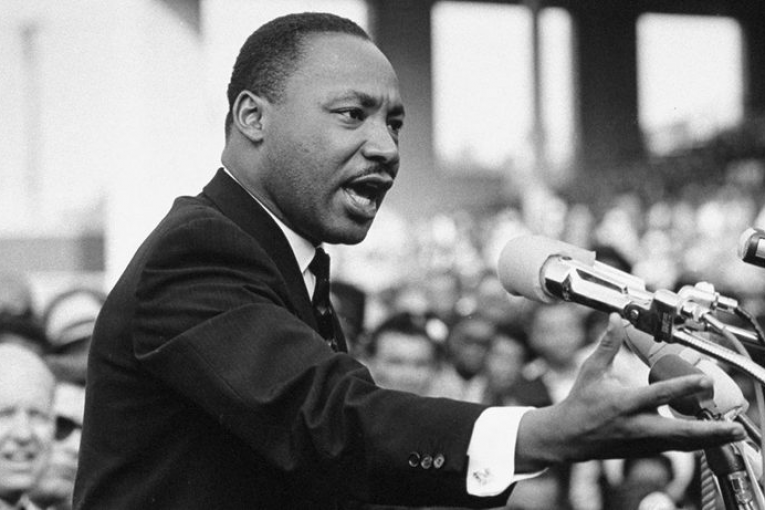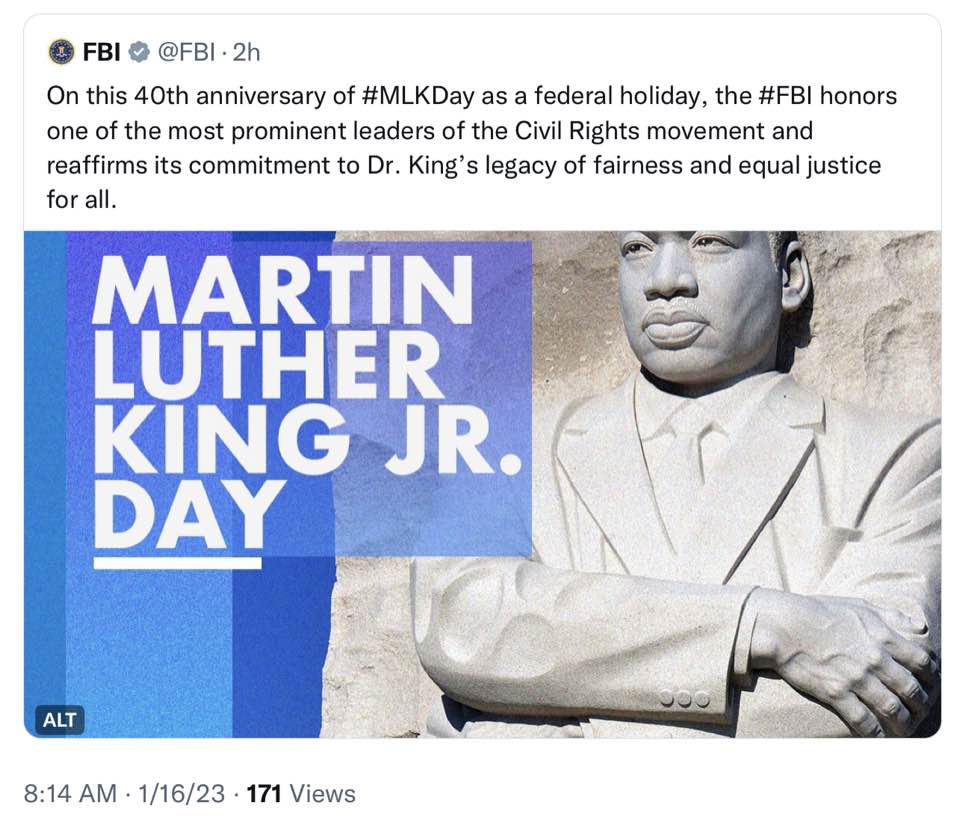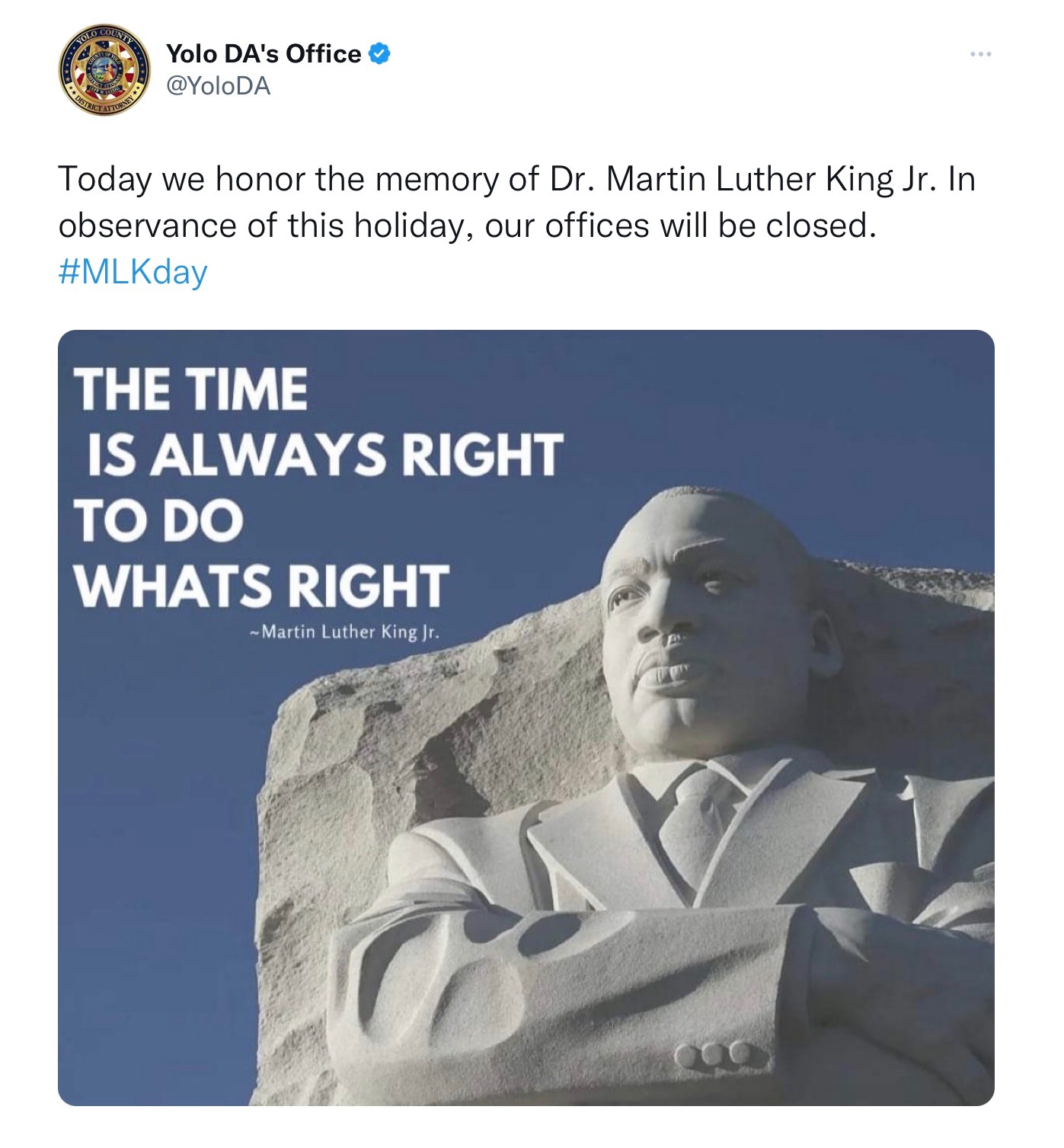

By David M. Greenwald
Executive Editor
Yesterday marked the 40th anniversary of MLK Day as a federal holiday. How easy it is to forget as everyone trips over themselves to honor the legacy of Dr. King, that King in his day was a polarizing and despised figure in many mainstream quarters and that even 40 years ago, nearly 15 years after his death, it was controversial creating a federal holiday to honor his legacy.
Flash forward in time and King has become a sanitized figure. People remember the “I Have a Dream Speech” and forget the radical King that took the system by storm and forced changed on a nation reluctant to live up to its creed.
Social media on Monday was a mass of messages honoring King and his legacy. But some of these struck me the wrong way.
The FBI for instance: “On this 40th anniversary of #MLKDay as a federal holiday, the #FBI honors one of the most prominent leaders of the Civil Rights movement and reaffirms its commitment to Dr. King’s legacy of fairness and equal justice for all.
 I wonder if whoever designed that tweet realized just how ironic it was. After all, during King’s lifetime, the FBI illegally wiretapped him. Attempted to infiltrate the Civil Rights Movement through COINTELPRO and even wrote a letter attempting to get the Rev. King to kill himself.
I wonder if whoever designed that tweet realized just how ironic it was. After all, during King’s lifetime, the FBI illegally wiretapped him. Attempted to infiltrate the Civil Rights Movement through COINTELPRO and even wrote a letter attempting to get the Rev. King to kill himself.
While you can argue it’s not the same FBI as it was under J. Edgar Hoover in the 1960s, I also found it ironic all of the DA’s offices across the country that have similarly honored Dr. King.
 I tried hard to suppress my laugh when San Luis Obispo DA Dan Dow tweeted out support for MLK. This is the office fighting to have a chance to prosecute Tianna Arata and other protesters who blocked traffic on the freeway in the weeks following the death of George Floyd.
I tried hard to suppress my laugh when San Luis Obispo DA Dan Dow tweeted out support for MLK. This is the office fighting to have a chance to prosecute Tianna Arata and other protesters who blocked traffic on the freeway in the weeks following the death of George Floyd.
After all, as we well know, MLK would never block traffic on a freeway—oh wait. Never mind.
Closer to home was DA Jeff Reisig’s message. This is the DA who in 2020, when Public Defender Tracie Olson pointed out the inequities in the jail, he unleashed an attack upon her.
DAs across the nation are in part responsible for locking Black and brown people disproportionately into cages—mass incarceration, what Michelle Alexander has called the New Jim Crow. But they all paused their pursuit of putting the descendants of civil rights advocates into cages to honor the legacy of Dr. King.
It is undoubtedly a mark of progress in this nation that we have gone from MLK as a polarizing figure to MLK as a sanitized teddy bear.
As a student of Dr. King, I have pulled together some quotes I highlighted in my reading over the last year.
Remember, King has a legacy of civil disobedience. That means disobeying unjust laws.
From the letter from the Birmingham Jail: “So I have tried to make it clear that it is wrong to use immoral means to attain moral ends. But now I must affirm that it is just as wrong, or even more so, to use moral means to preserve immoral ends.”
He later added, “There are just laws and there are unjust laws. I would be the first to advocate obeying just laws. One has not only a legal but a moral responsibility to obey just laws. Conversely, one has a moral responsibility to disobey unjust laws.”
MLK: “[F]or passively to co-operate with an unjust system makes the oppressed as evil as the oppressors.”
King on Riots:
Living with the daily ugliness of slum life, educational castration and economic exploitation, some ghetto dwellers now and then strike out in spasms of violence and self-defeating riots. A riot is at bottom the language of the unheard. It is the desperate, suicidal cry of one who is so fed up with the powerlessness of his cave existence that he asserts that he would rather be dead than ignored.
Touring Watts a few days after that nightmarish riot in 1965, Bayard Rustin, Andrew Young and I confronted a group of youngsters who said to us joyously, “We won.”
We asked them: “How can you say you won when thirty-four Negroes are dead, your community is destroyed, and whites are using the riot as an excuse for inaction?”
Their answer: “We won because we made them pay attention to us.”
As long as people are ignored, as long as they are voice-less, as long as they are trampled by the iron feet of exploitation, there is the danger that they, like little children, will have their emotional outbursts which will break out in violence in the streets.
White people need to educate themselves:
“Whites, it must frankly be said, are not putting in a similar mass effort to reeducate themselves out of their racial ignorance. It is an aspect of their sense of superiority that the white people of America believe they have so little to learn. The reality of substantial investment to assist Negroes into the twentieth century, adjusting to Negro neighbors and genuine school integration, is still a nightmare for all too many white Americans.”
(I would argue this still holds true today).
King on Affirmative Action – many believe that King somehow would have opposed affirmative action.
“It is, however, important to understand that giving a man his due may often mean giving him special treatment. I am aware of the fact that this has been a troublesome concept for many liberals, since it conflicts with their traditional ideal of equal opportunity and equal treatment of people according to their individual merits. But this is a day which demands new thinking and the reevaluation of old concepts. A society that has done something special against the Negro for hundreds of years must now do something special for him, in order to equip him to compete on a just and equal basis.”
I find this quote, however, even more interesting:
“Four million newly liberated slaves found themselves with no bread to eat, no land to cultivate, no shelter to cover their heads. It was like freeing a man who had been unjustly imprisoned for years, and on discovering his innocence sending him out with no bus fare to get home, no suit to cover his body, no financial compensation to atone for his long years of incarceration and to help him get a sound footing in society; sending him out with only the assertion: ‘Now you are free.’ What greater injustice could society perpetrate?”
Not only does this quote apply to affirmative action, but it applies to our practice today of how we treat many who have been wrongly convicted, and even some whom we have justly incarcerated.






